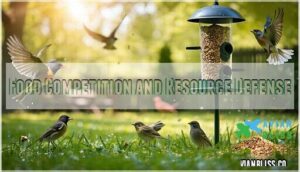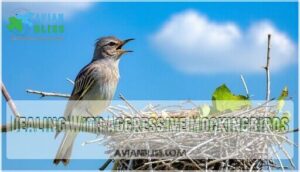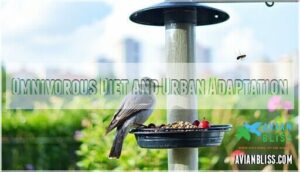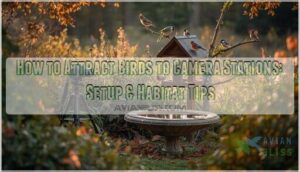This site is supported by our readers. We may earn a commission, at no cost to you, if you purchase through links.

They’re not being mean; they’re following powerful parental instincts that guarantee their offspring’s survival. Understanding what triggers this behavior and how mockingbirds recognize individual threats can help you navigate these encounters safely while respecting these exceptional birds.
Table Of Contents
- Key Takeaways
- Mockingbird Aggression: Why So Fearless?
- What Triggers Mockingbird Aggression?
- Dealing With Aggressive Mockingbirds
- Similar Aggressive Bird Species
- Mockingbird Behavior and Habitat
- Respecting Mockingbirds and Their Role
- Frequently Asked Questions (FAQs)
- Is a mockingbird aggressive?
- Why do mockingbirds swoop at you?
- What can you do about territorial mockingbirds?
- How to get mockingbird to go away?
- Can I relocate a mockingbird nest to avoid aggression?
- Do mockingbirds attack people only during breeding season?
- Are baby mockingbirds born with their eyes open?
- Can I feed mockingbirds to reduce aggression towards me?
- Will mockingbirds eventually get used to my presence?
- Do mockingbirds attack at night?
- Conclusion
Key Takeaways
- You’ll trigger mockingbird aggression by walking within 15 feet of their nest during breeding season (March-August) – they’re not mean, just protective parents defending their young.
- Give aggressive mockingbirds space and take alternate routes around their territory since they can recognize individual humans and remember you as a threat for months.
- You can’t legally relocate mockingbird nests or harm these federally protected birds – coexistence through avoidance is your only legal option.
- Their aggressive behavior is temporary, typically lasting only until their chicks leave the nest, so patience during nesting season will resolve most conflicts.
Mockingbird Aggression: Why So Fearless?
You’ve probably encountered an aggressive mockingbird if you’ve walked too close to their territory during nesting season. These fearless birds don’t hesitate to dive-bomb anything they perceive as a threat, from humans to cats and even larger animals.
Mockingbirds turn into feathered warriors when protecting their young—no creature is too big to challenge
Territorial Behavior
Most mockingbirds stake out territory spanning one to five acres, treating it like their personal kingdom. These fierce defenders use Territorial Marking through vocalizations and Border Patrols to warn intruders.
Their Threat Response involves aggressive displays and divebombing tactics. Resource Guarding drives their territoriality – they’ll defend prime nesting spots, food sources, and Spatial Arrangements within their domain through relentless Territorial Defense mechanisms.
Nesting Season Aggression
When spring arrives, aggressive breeding behavior becomes the main focus. Parental instincts kick into overdrive, transforming these birds into feathered bodyguards. Nest defense becomes their top priority during nesting season, with territorial marking reinforcing boundaries.
You’ll witness seasonal aggression patterns peak as they employ various nest defense strategies. This nesting season aggression isn’t random—it’s calculated protection ensuring their offspring survive. Understanding bird nesting season behavior patterns is essential to recognizing the motivations behind their actions.
Dive-Bombing Humans and Animals
When you’re caught in an aggressive mockingbird’s crosshairs, their dive bombing tactics become unmistakable. These defensive strategies escalate quickly—watch for warning signs like harsh alarm calls and swooping flights.
During urban encounters, mockingbirds will divebomb anyone they perceive as threatening their territory. This aggressive display represents pure parental instinct, not malice.
Aggressive bird behavior peaks during nesting season when protective parents defend their young at all costs.
What Triggers Mockingbird Aggression?
You’re likely dealing with an aggressive mockingbird because you’ve gotten too close to their nest or entered their territory during breeding season. These protective parents also attack when they spot potential threats like cats, dogs, or other predators near their young.
Human Proximity to Nests
When you venture too close to a mockingbird’s nest, you’re entering their danger zone. These protective parents show zero tolerance during nesting season, launching defensive strategies against human threats. Nest disturbance triggers intense mockingbird aggression as proximity effects activate their bird nest defense system.
Here’s what triggers their nesting behavior:
- Walking within 15 feet of active nests during May-August breeding season
- Making sudden movements or loud noises near nesting sites
- Repeatedly passing the same nest location, which increases their wariness
- Approaching low nests positioned 3-10 feet off the ground near walkways
- Disturbing nesting materials or investigating nest contents too closely
Mockingbirds exhibit unique abilities, such as recognizing individual humans, which plays a significant role in their defensive behavior.
Cat and Other Predator Threats
Cats aren’t the only threat these aggressive mockingbird parents face. Urban predators like snakes, crows, and squirrels trigger intense aggressive bird behavior and dive-bombing attacks. Mockingbirds use predator avoidance tactics, including nest camouflage and mobbing behaviors. Their territoriality extends to all snake threats and potential nest raiders.
Cat deterrents work well—keep pets indoors during nesting season.
Food Competition and Resource Defense
Food battles aren’t just about predators—mockingbirds wage war over meals too. These territorial birds fiercely guard feeders, fruiting trees, and prime foraging spots from competitors. During food scarcity, their aggressive mockingbird behavior intensifies as they chase away cardinals, sparrows, and other species. Their territoriality extends beyond nesting to resource allocation throughout their domain. The mockingbirds’ behavior is influenced by their preference for suet food sources, which plays a vital role in their feeding habits.
- Feeder Monopolization: Mockingbirds dominate backyard feeders, using aggressive displays to exclude smaller birds from high-energy foods like suet and fruit.
- Seasonal Defense Patterns: Winter brings heightened food competition when natural resources dwindle, making mockingbird aggression more pronounced around reliable food sources.
- Strategic Foraging Behaviors: These birds employ vocal mimicry and aerial attacks as feeding strategies, signaling territory ownership while physically deterring competitors from valuable resources.
Dealing With Aggressive Mockingbirds
When you encounter an aggressive mockingbird, your best strategy is to simply give them the space they’re demanding. These protective parents aren’t trying to be bullies—they’re just doing what evolution programmed them to do when they perceive a threat to their young.
Give Them Space and Avoid Confrontation
The best aggressive mockingbird defense? Respect nesting area boundaries and maintain safe distance guidelines. These protective parents recognize repeat offenders, so avoid their territory entirely during breeding season.
Aggression prevention tips work: take alternate routes, wear neutral colors, and move slowly. Smart human mockingbird coexistence prevents urban bird conflicts while protecting both species.
Effective use of bird deterrent methods can also minimize encounters with aggressive mockingbirds.
Understanding Protective Parenting Instincts
Every aggressive mockingbird transforms into a fierce guardian during nesting season, driven by powerful parental instincts. These protective parents use aggressive displays and territorial marking to shield their young from perceived threats.
Picture their brood defense strategies:
- Dive-bombing intruders with precision strikes
- Alarm calling to warn neighbors of danger
- Mobbing predators with relentless pursuit
This aggressive bird behavior reflects their nesting strategies – they’re hardwired to protect at all costs. Effective bird deterrent methods can help mitigate these behaviors.
Legal Protection of Mockingbirds
Before taking action against aggressive Northern Mockingbird behavior, understand that Wildlife Regulations and the Migratory Bird Treaty Act protect these birds. Conservation Laws prohibit killing or relocating mockingbirds without federal permits. Environmental Policies enforce strict penalties—up to $15,000 fines per bird. Bird Conservation efforts require respecting their Bird Sanctuary status, making coexistence your best legal option.
It’s essential to recognize bird species protection when dealing with aggressive mockingbirds to guarantee compliance with federal laws and regulations.
Similar Aggressive Bird Species
If you’re dealing with one aggressive bird, you’ll likely encounter others with similar protective instincts. Crows, red-winged blackbirds, blue jays, and hawks all share the mockingbird’s fierce dedication to defending their territory and young during nesting season.
Crows, Hawks, and Other Bird Species
While mockingbirds grab headlines for their aggressive antics, they’re not the only feathered foes you’ll encounter in your backyard. Bird Species Comparison reveals that several other species exhibit similar Aggressive Bird Behavior during breeding season. These Urban Bird Dynamics create fascinating yet challenging encounters for homeowners seeking peaceful coexistence.
Understanding Avian Predator Prey relationships helps explain why these birds become territorial guardians. Their Aggressive Behavior stems from powerful parenting instincts that kick into overdrive during Nesting Behavior periods.
Here are three notorious aggressive bird species you might face:
- Crows: Master strategists with outstanding intelligence, they’ll coordinate group attacks and remember your face for years
- Red-winged Blackbirds: Fierce defenders that’ll dive-bomb anyone approaching their marsh territories with surprising speed
- Blue Jays: Bold bullies known for mobbing larger predators and driving away competing species from prime nesting spots
These Bird Aggression patterns mirror aggressive mockingbird tactics, making territorial defense a common thread among protective parents. The crows’ behavior is a prime example of crow attack strategies that are used to protect their territory and young.
Protective Behavior During Nesting Season
Many birds become protective parents during nesting season, employing aggressive display and territorial marking. Crows, hawks, and robins share these parental aggression patterns with mockingbirds.
Their nest defense strategies include dive-bombing, loud alarm calls, and mobbing behavior. These brood protection instincts peak when eggs hatch, creating intense defensive zones around active nests.
Coexisting With Aggressive Birds
Living peacefully with aggressive mockingbirds and other protective parents requires smart Urban Wildlife management. These feathered defenders aren’t looking for trouble—they’re just protecting their families. Here’s your survival guide for Conflict Resolution:
- Maintain respectful distance from nests (at least 10 feet away)
- Avoid direct eye contact or threatening gestures toward birds
- Create Bird Friendly Zones by redirecting foot traffic during nesting season
- Use Avian Behavior Modification through gentle deterrents like wind chimes
Mockingbird Behavior and Habitat
Understanding mockingbird behavior helps explain why they’re so aggressive and when you’re most likely to encounter their defensive actions.
These adaptable birds have thrived in suburban areas where their natural instincts for territory protection often clash with human activities.
Omnivorous Diet and Urban Adaptation
Why do these birds flourish in cities? Northern Mockingbirds excel at Urban Foraging, exploiting diverse Food Sources from bird feeders to ornamental plants. Their Seed Preferences and Fruit Consumption habits adapt perfectly to Suburban Environments.
Insect Hunting provides protein, while berries sustain them year-round. This dietary flexibility transforms Urban Wildlife challenges into opportunities, supporting their Mockingbird Behavior in densely populated areas. The presence of bird feeding stations also contributes to their thriving population in urban areas.
Mimicry and Song Patterns
These impressive vocal artists can master over 200 different sounds through complex Song Learning processes. Northern Mockingbird Vocal Imitation involves three key stages:
- Melodic Patterns acquisition during juvenile development phases
- Harmonic Structure perfection through practice and repetition
- Cultural transmission of Mimicry Skills between generations
Mimus polyglottos demonstrates outstanding Mockingbird Behavior when vocalizing, often performing complex acoustic displays that showcase their adaptive intelligence.
Breeding and Nesting Habits
Understanding mockingbird breeding habits reveals why they’re such aggressive, protective parents during nesting season. These territorial birds don’t mess around in the process of raising their young.
Key breeding and nesting patterns:
- Nest Site Selection – They pick dense shrubs or trees 3-10 feet high, often in suburban areas where they can easily spot threats approaching their territory.
- Breeding Seasons – Mockingbirds produce 2-3 broods annually from March through August, with each pair defending the same territory throughout multiple mating cycles.
- Nesting Materials – Both parents build sturdy nests using twigs, leaves, and roots, creating safe havens that require fierce protection for successful brood survival and proper fledgling care.
Respecting Mockingbirds and Their Role
While mockingbirds’ aggressive behavior can frustrate homeowners, you should remember these birds play essential roles in maintaining healthy ecosystems.
They control insect populations and contribute to urban biodiversity, making them valuable neighbors worth respecting despite their territorial nature.
Ecosystem Importance and Insect Control
Despite their aggressive reputation, mockingbirds excel at pest regulation, consuming up to 50% insects during nesting season. These feisty defenders remove hundreds of harmful beetles, caterpillars, and grasshoppers weekly from your garden. Their territorial Mockingbird Behavior creates ecosystem balance by targeting crop-damaging species like cutworms. This natural insect population control reduces pesticide dependence while supporting food chains.
Ecosystem Benefits How Mockingbirds Help
Their aggressive mating and Environmental Factors actually strengthen biodiversity conservation efforts.
Biodiversity and Environmental Health
Mockingbirds help maintain Ecological Balance by supporting Wildlife Conservation efforts and Urban Ecosystems. Environmental Sustainability depends on Habitat Preservation as Environmental Factors affect these adaptable birds. Northern Mockingbirds thrive in Suburban Wildlife settings, even Desert Ecosystem areas, showing extraordinary resilience despite mockingbird aggression being misunderstood.
- Ecological Balance: Control insect populations while supporting plant pollination
- Wildlife Conservation: Serve as indicator species for environmental health monitoring
- Urban Ecosystems: Bridge natural and developed areas, fostering biodiversity
- Environmental Sustainability: Adapt to climate changes, maintaining stable populations
- Habitat Preservation: Require diverse vegetation for nesting and food sources
Coexisting With Mockingbirds in Urban Environments
Living alongside aggressive mockingbirds in suburban environments requires smart strategies. These protective parents defend territories fiercely, but you can minimize mockingbird aggression through thoughtful actions.
Create bird friendly gardens with native plants to support their mockingbird diet. Keep cats indoors and maintain distance from nests during breeding season. Suburban landscaping that includes diverse food sources reduces conflicts.
Urban birdwatching teaches you their patterns, enabling peaceful environmental coexistence with these extraordinary defenders.
Frequently Asked Questions (FAQs)
Is a mockingbird aggressive?
Yes, you’ll find mockingbirds can be quite aggressive, especially during nesting season. They’ll dive-bomb people, pets, and other animals that get too close to their territory, using sharp calls and physical attacks to defend their young.
Why do mockingbirds swoop at you?
You’re experiencing their fierce nest defense instincts. These protective parents dive-bomb perceived threats within their territory, especially during breeding season when they’re safeguarding eggs or chicks from potential predators.
What can you do about territorial mockingbirds?
Urban mockingbirds recognize individual humans after just two encounters, targeting repeat nest disturbers. You can escape their territorial grip by maintaining distance from nesting areas, wearing neutral colors, and avoiding sudden movements that trigger their defensive instincts.
How to get mockingbird to go away?
You can’t force mockingbirds to relocate since they’re federally protected. Instead, avoid their territory, wear neutral colors, move slowly, and wait—they’ll usually move on after nesting season ends.
Can I relocate a mockingbird nest to avoid aggression?
You can’t legally relocate mockingbird nests – it’s protected under federal law. Moving nests disrupts their breeding cycle and often causes abandonment.
Instead, keep your distance during nesting season and wait it out.
Do mockingbirds attack people only during breeding season?
Mockingbirds don’t limit their attacks to breeding season alone. You’ll face their aggression year-round when they’re defending territories, though it peaks during spring and summer nesting periods when they’re protecting offspring.
Are baby mockingbirds born with their eyes open?
Baby mockingbirds hatch with their eyes tightly closed, remaining helpless and blind for about ten to thirteen days. You’ll notice their eyes gradually open as they develop strength and coordination.
Can I feed mockingbirds to reduce aggression towards me?
Like offering tribute to an ancient guardian, feeding mockingbirds might seem like diplomatic peace-making, but it won’t turn off their protective instincts. You’ll likely escalate conflicts instead of resolving them.
Will mockingbirds eventually get used to my presence?
You might gradually become less threatening to them, but don’t count on it. These birds have excellent memories and can recognize specific people who’ve disturbed their territory, often maintaining wariness for months or even years after initial conflicts.
Do mockingbirds attack at night?
Contrary to popular belief that nocturnal birds are always active, mockingbirds rarely attack at night since they’re diurnal creatures who rest after sunset, making your evening walks safer.
Conclusion
Like a vigilant guardian protecting precious treasure, an aggressive mockingbird’s fierce behavior stems from powerful parental instincts rather than malice. These outstanding birds simply want to safeguard their young to survive in an increasingly challenging world.
By understanding their territorial nature and giving nesting pairs adequate space during the breeding season, you can peacefully coexist with these protective parents. Mockingbird aggression is temporary, usually lasting only until their chicks fledge and leave the nest safely.












